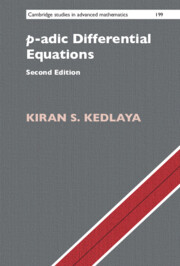Book contents
- Frontmatter
- Contents
- Preface
- Acknowledgments
- 0 Introductory remarks
- Part I Tools of p-adic Analysis
- Part II Differential Algebra
- Part III p-adic Differential Equations on Discs and Annuli
- 8 Rings of functions on discs and annuli
- 9 Radius and generic radius of convergence
- 10 Frobenius pullback and pushforward
- 11 Variation of generic and subsidiary radii
- 12 Decomposition by subsidiary radii
- 13 p-adic exponents
- Part IV Difference Algebra and Frobenius Modules
- Part V Frobenius Structures
- Part VI The p-adic local monodromy theorem
- Part VII Global theory
- Appendix A Picard–Fuchs modules
- Appendix B Rigid cohomology
- Appendix C p-adic Hodge theory
- References
- Index of notation
- Subject index
13 - p-adic exponents
from Part III - p-adic Differential Equations on Discs and Annuli
Published online by Cambridge University Press: 06 August 2022
- Frontmatter
- Contents
- Preface
- Acknowledgments
- 0 Introductory remarks
- Part I Tools of p-adic Analysis
- Part II Differential Algebra
- Part III p-adic Differential Equations on Discs and Annuli
- 8 Rings of functions on discs and annuli
- 9 Radius and generic radius of convergence
- 10 Frobenius pullback and pushforward
- 11 Variation of generic and subsidiary radii
- 12 Decomposition by subsidiary radii
- 13 p-adic exponents
- Part IV Difference Algebra and Frobenius Modules
- Part V Frobenius Structures
- Part VI The p-adic local monodromy theorem
- Part VII Global theory
- Appendix A Picard–Fuchs modules
- Appendix B Rigid cohomology
- Appendix C p-adic Hodge theory
- References
- Index of notation
- Subject index
Summary
In this chapter, we study p-adic differential modules in a situation left untreated by our preceding analysis, namely when the intrinsic generic radius of convergence is equal to 1 everywhere (the Robba condition). This setting is loosely analogous to the study of regular singularities of formal meromorphic differential modules considered in Chapter 7; in particular, there is a meaningful theory of p-adic exponents in this setting. However, some basic considerations indicate that p-adic exponents must necessarily be more complicated than the exponents considered in Chapter 7. For instance, the p-adic analogue of the Fuchs theorem can fail unless we impose a further condition: the difference between exponents must not be p-adic Liouville numbers. With this in mind, we may proceed to construct p-adic exponents for differential modules satisfying the Robba condition. Such modules carry an action of the group of p-power roots of unity via Taylor series; under favorable circumstances, the module splits into isotypical components for the characters of this group. We may identify these characters with elements of Z_??, and these give the exponents.
- Type
- Chapter
- Information
- p-adic Differential Equations , pp. 233 - 258Publisher: Cambridge University PressPrint publication year: 2022



